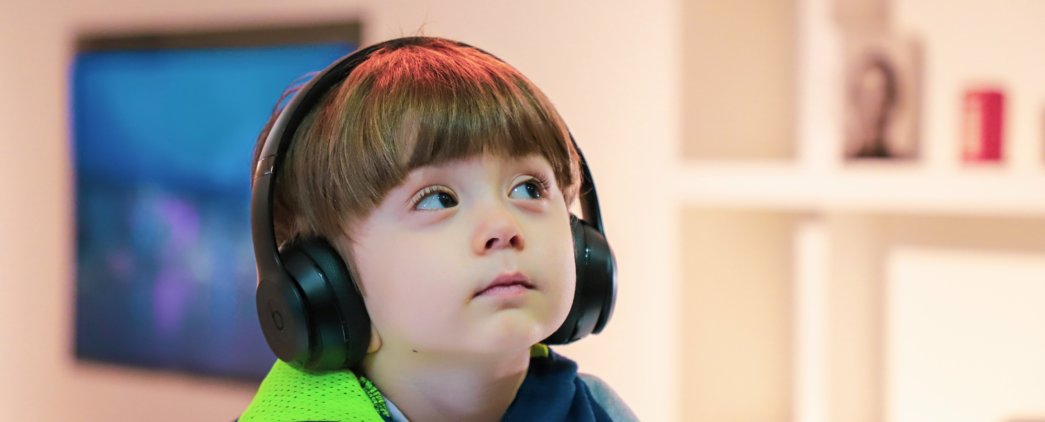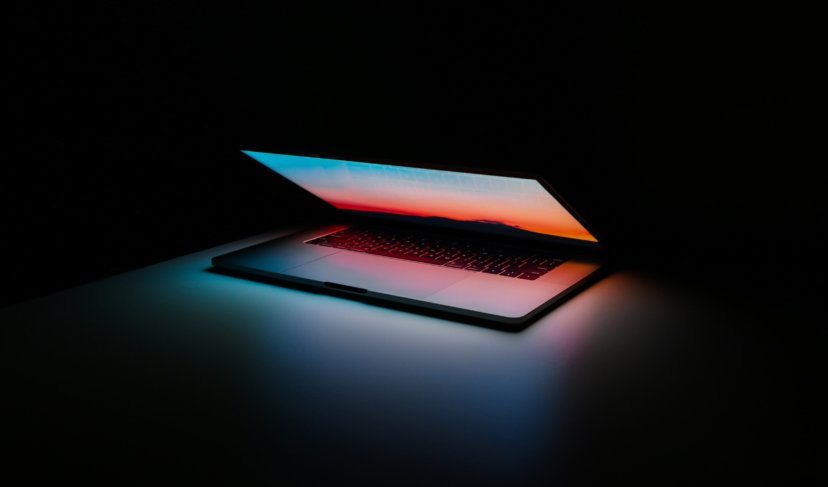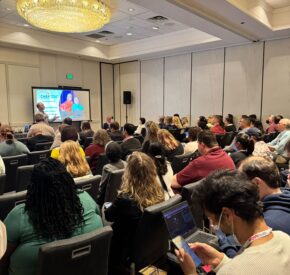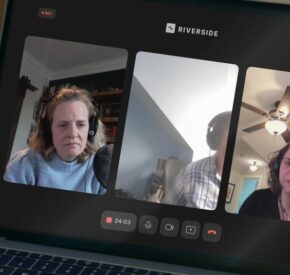Access to Information is a Human Right
Article 19 discusses the ethos of access to information as a human right

In this episode, Mike, Marty and Amanda discuss and analyze a core sentiment to our digital accessibility work. Specifically the belief that ‘access to information is a human right.’ As Molloy states, “information is the social currency of our time.” Information allows us to learn, grow and make more effective decisions. Denial or blocking access to information leads to digital poverty. Tune in and listen to passionate individuals elaborate and debate this ethos. Through their passion and experience, they provide insights into creating equitable access to information for all by unlocking doors to an accessible web.
Meet our hosts:
- Amanda Roper, Tamman’s former Digital Accessibility Program Manager, led the development and management of digital accessibility products and services. She played a key role in establishing Tamman’s reputation as a trusted partner in inclusive digital solutions.
- Marty Molloy, the current President of Tamman, is a passionate leader dedicated to building inclusive teams and fostering a culture of growth. With a background in non-profit leadership and education, he is committed to leveraging technology to create positive impact and make the world more accessible and equitable for all.
- Michael Mangos, Co-Founder of Tamman, is a seasoned tech expert with over two decades of experience. He helps organizations improve their digital accessibility through strategic planning, training, and technical solutions.
Listen to more Article 19 Podcast Episodes
Full Transcript
Access the PDF Transcript
Voiceover:
Expression is one of the most powerful tools we have. A voice, a pen, a keyboard.
The real change, which must give to people throughout the world their human rights, must come about in the hearts of people. We must want our fellow human beings to have rights and freedoms, which give them dignity.
Article 19 is the voice in the room.
Amanda:
Hello, and welcome to Article 19 everyone. My name is Amanda Roper. I am the program manager of Tamman’s accessibility initiative, and I am the host for our conversation today. Today’s show is gonna feature an all Tamman cast with my cohost Marty Molloy, Chief of Staff and Catalyst at Tamman. Hey, Marty.
Marty:
Hi, Amanda.
Amanda:
And we are joined again today by our esteemed head honcho, Michael Mangos, CEO and cofounder of Tamman. Hello, Mike.
Mike:
Hi, Amanda. Hey, Marty.
Marty:
Hey, Mike.
Amanda:
Before we begin, I want to set the stage for our listeners today. For our conversation, just to let everyone know that this podcast was born from the decision at Tamman to state clearly and plainly that access to information is a human right, full stop. The developers and designers at Tamman work hard every day to make sure that no matter what use constraint a user may have, be it due to a temporary, situational, or permanent condition or disability, they will be able to access the information designed and built by Tamman. This podcast is a call for others to join in a bigger conversation with us. We want to build the inclusive web. To do that, we need all of us working together and learning together to do this. Thanks, everyone for listening, and let’s get the conversation started. Hey, Marty and Mike.
Marty:
Hey, Amanda.
Amanda:
How are you guys doing tonight?
Marty:
Good. We spent much of the day together, and we’re just kind of continuing the conversations that we have at Tamman already, so this is going to be fun.
Mike:
It’s actually fun for me to keep these conversations going after the sun sets. I have a window right behind my desk, and all day long it’s always bright and I’m looking out, and now the sun has set, and I feel kind of relaxed in a different way. We can sit down and have just a conversation. It feels more natural, more fun, and one of these days I’m going to start pouring scotch.
Marty:
I was going to say. You need you scotch, neat.
Amanda:
I’ll join you on that. I wish I had that cool mood lighting that you have, Mike, though I don’t have that going on. To get us a little bit more warmed up, since we all talk all day, but we don’t really take ourselves out of it too much, I have an opening, easy, fun question, and that is, if you had to eat the same meal for the rest of your life, what would you choose and why?
Marty:
I’ll go first. This is a very easy question for me. As Elaine Benes said, “give me the big salad.” I want a gigantic salad with lots of tomatoes, just as many tomatoes that can fit in there, but I’m talking like the big, fat beefsteak Jersey tomatoes from August that are just juicy and drippy everywhere. I want chickpeas in that, cauliflower, broccoli. I want every kind of thing you can put in a salad. I want it in that big, giant salad, and then I want an Italian dressing with extra red wine vinegar. That, I would eat every single day. It would be healthy, and the crunch, the whole thing, the tartness of the vinegar — I could drink vinegar on a regular basis, so that would be the meal that I would choose every day for the rest of my life.
Mike:
I really fell in love with the concept of lots of tiny dishes, like a bite of two, and all those courses kind of being served together in Japan. When you stay at a ryokan — they’re like these guest houses in Japan, and they serve you dinner, the more dishes, the fancier it is. I stayed at a couple of places where you get 17, 18 dishes, each one having a bite or two, but it’s such a variety of things. Some of them are sweet. Some of them are crunchy. Some of them are savory. Some of them are weird, but just the idea of the variety of that — I don’t think I would ever really get too bored, and it’s always incredibly healthy, so I would totally do that every day if I could.
Marty:
I kind of feel like you broke the rules on this question just a little bit, Mike.
Amanda:
I think you guys both broke the rules, but it sounds like Marty wants a salad, and Mike wants a deconstructed salad, and I love it.
Marty:
That seems about right. Pretty much, yeah.
Amanda:
Getting into our first segment here, these are more broad topics for us to discuss. The first question goes to you, Marty. Why should access to information be a human right anyway?
Marty:
This is the question that consumes me at Tamman. It is not only our north star. It’s the reason for this podcast. It’s why we do what we do, and it’s because information is the social currency of our time, and by denying access to information, we are not allowing people to live their fullest lives. More and more, the web and apps on our phones and all these different places, social media, etc. — they are the way in which we are living our lives, and when we systematically deny people access to any segment of that, we are denying them that social currency. We’re creating a digital poverty, and when we create digital poverty, we create real inequality in the world as well. It’s only going to grow. This is only going to become more and more the way that we do things, as we’ve seen over the course of the last 10, 15 years. This goes well beyond the United States. I think this is a global issue. It’s a global problem by not allowing people access to information, and it’s not just to do the things they need to do in their lives. This is information to be able to make decisions. When Google is a noun and a verb and frankly sometimes an adjective, we know that our lives need a flow of information that is constant, and that makes it a human right.
Mike:
Marty, do you think that access to all information is important? I think you and I probably have largely overlapping definitions here. I probably have a slightly different take on a little bit of that. I don’t see all speech as protected. I read the Constitution or the Bill of Rights in a way that says most speech is protected, but not all speech, and I don’t feel particularly compelled that unprotected speech is also what I want to be providing, so I kind of have a feeling with it, but I do agree that everything that would be considered protected speech in the United States at least would be something that I would want to give access to and that I believe is a human right, but how do you feel about that, Marty?
Marty:
Well, I feel about it the way that I feel about the Oxford comma, Mike, and now we’re going to explain to listeners that we’ve had a long running debate about the Oxford comma, but yes, of course. There is a hierarchy of information, and just like you can’t yell fire in a crowded theater, which is always the sort of example, things that are dangerous, things that create hazards clearly are not the same as making sure that someone can access a particular piece of educational information or making sure that our kids can do the research that they need to be able to do online or make sure that someone with a particular use constraint, when they are accessing the web, whether that’s temporary or situational or permanent, can do the banking they need to do or do the X, Y, and Z that they need to do. I think yes, there is obviously no absolute with this, but I think when we don’t speak in terms of sort of a bit of an extreme, and I like to be in that space where we are planting our flag in a little bit more of an extreme space, I think people aren’t going to always listen and prioritize this the way that I know they must to have a more equitable society. But the Oxford comma, I will say — this is really important for listeners to understand, that while I strongly disagree with the Oxford comma when I do my own writing, Mike has convinced me that it is more accessible because it creates clarity, so there is a bit of a danger when we’re in that extreme space and that absolute space when we aren’t a little bit clear, much like the Oxford comma is more accessible because it creates clarity and understanding for people, I do see that there is a space for nuance.
Mike:
Marty, I will wrap up that question just by offering you my gratitude for conceding the Oxford comma point after many years of arguing about it.
Marty:
Yes, indeed.
Amanda:
It was a big day at Tamman when Marty admitted the defeat.
Marty:
But if there are listeners out there who want to reengage and reignite me in the debate of the Oxford comma, I’m always open to that.
Amanda:
You guys are kind of dancing around this next question that I have for you. Access to information — who’s at the gate? What’s a gatekeeper? What type of access do people have to information? When and how, and do you guys think that Tamman is a gatekeeper of accessibility information? How would you define gatekeeper?
Mike:
That’s a really great question. This is purely my opinion, right? I think that gatekeepers are the ones who can prevent people from getting access to information or can unlock the doors, so it’s pretty easy to think of a platform as a gatekeeper because a platform could shut down or disallow people to use the platform, right? Think about banning users or kicking a particular service off. We’ve heard about that recently. Amazon, Facebook, Twitter kicking certain user groups off or certain individuals. I think we’re not a platform at Tamman, but when I think about Tamman being a gatekeeper, I think builders can be gatekeepers, too. If we can recontextualize or reframe the idea that a gatekeeper is not just a person who has a key to an already made gate, but that the gate itself if not constructed properly can create that barrier, then the builders or the designers of the gate are also gatekeepers in a way. Even though they may not be able to open it and close it at will. there is this idea that if you design something either on purpose or just without intentionality in a way that prevents somebody from getting through that gate, you have made yourself a gatekeeper, too. I do see us as gatekeepers in that context, so because our mission is “access to information is a human right,” we want to open those gates. It’s incumbent upon us as a team and a company to make gates that are open or can easily be opened. Does that make sense?
Marty:
It does. I love that idea. When I first thought about gatekeeper as you were asking that question, Amanda, I was like, “no, gatekeepers bad,” and then Mike of course jujitsus it and turns it into “they’re the people who unlock the –” It’s like, “oh, God, that’s just wonderful and brilliant.” Mike, you’re right. Builders can be gatekeepers and making sure they can unlock the door. But there is a danger with that, and because I really feel uncomfortable with platforms being able to limit speech. I understand it, but I’m uncomfortable with it, and I think that that’s OK. I can be — I can live in my uncomfortable space because I think if we are not the ones unlocking the doors, but we’re the ones shutting the doors and shutting people out, then we need to have a bigger discussion around who, what, when, where, why, and when, and how. There needs to be some longer conversations around that.
Mike:
I’m sure a lot of people could say, “hey, if you build something that’s accessible but you’re not the one who’s opening and closing the door, you’ve just made a door that is openable. All you’ve done is maybe punt responsibility,” so there’s a part of that, too. We all have to platy our part, so I like to think of us as gatekeepers because we can play our party. We have abdicated some of that responsibility of actually opening the door for another person, but if we think of ourselves as gatekeepers, we suddenly then can apply more intentionality to our work every day.
Marty:
And building a site that doesn’t have — is just a wall to somebody. Obviously, you’ve limited those options already, so that’s a really good point, Mike.
Amanda:
Yeah, I think the opposite of a gatekeeper is more like a dungeon master, where you know where all of the keys and the locks are, but you’re not going to tell anyone. I like the mindset of like Tamman is that gatekeeper who is opening up these gates and building these gates and building these doors.
Marty:
And I think it’s important that we have Dungeons and Dragons references at some point in every podcast of Article 19 that we do, so just to put that out there, too. I like that you brought that in, Amanda.
Mike:
This is like three for three or four for four now, right?
Amanda:
Yep. Speaking of access information and gatekeepers and such, what are the ethics around access information? This is mostly to Marty, but I think you guys should both chime in on this one.
Marty:
Wow. I struggle. Mike, you alluded to it already because this is certainly not a new conversation for us, but I do tend to be more on the absolutist side of these things and wanting as much information to be out there for folks as possible, and I see that as a natural good, so the idea of having ethics around it — I see that it becomes quickly a bit of a necessary evil. Because the prevalence of disinformation requires it, that we have some access to information, or at least definitions. Ethics can be very — it plays in those gray areas, and I think that’s a nice space for it to be, but we’re seeing it more and more that one person’s information is another person’s disinformation and that two people can watch or listen to two different things and have completely different realities. That’s the power of information. The way that I would prefer that people engage with it — and this is a bit pie in the sky and maybe Pollyanna-ish, is that they would see that, “OK, I’m going to consume as much information as I can. Some of that’s going to be disinformation, but because I’m consuming so much of it, I’m going to be able to filter it through my own logic and reasoning and come out on the other side with a particular opinion, but it’s not an isolated opinion. It’s one that’s born from a lot of different spaces.” The problem is I don’t think people are doing that as much as they used to and that the digital world that we’re living in is so siloed that people are getting stuck in their little silos, and we haven’t figured out enough bridges to those other silos and those other pieces of information to allow them to be able to consume it in the way, that cornucopia of information that I want people to be able to have access to.
Mike:
I’m going to answer a slightly different way here because I think that the way you asked the question is interesting. Ethics around access to information. One of the things as builders, going back to the previous answer, is we’re really trying to create equal access to information, so it’s not so much that we’re trying to decide which information should we have access to. That is a big conversation, and I think rather than us in a professional services capacity as a company or a team, we try to create equal access to information. That seems pretty easy to get behind, right? And very easy, very obvious, but there’s other kinds of access to information too that we’ve got to talk about. I had a great professor at Drexel, Dr. Kate McCain, and she was the first one to enlighten me around this concept of temporary access to information versus sort of ongoing or permanent access. The idea that you used to be able to buy a DVD, but now you pay for a streaming service. You’re essentially renting access to information in that scenario now versus owning something, and the opportunities to own information is diminishing, and the need to pay for rented access to information is increasing, and it’s become monetized. A market has been created around this where libraries don’t even have permanent access to information, where they have to rent it, and that creates like a paywall barrier to access to information in a way that — it’s not just digitally accessible to people of all abilities, but what about people of different income levels? And can they afford to continue to rent information instead of owning it or having it be in the public domain? Because even public domain information, you still oftentimes need to pay to get to it just because of platforms and gatekeepers. It’s another podcast, I’m sure, another day, but I just wanted to give her a shout out because she really had a huge impact on me when I was in college, and it has permeated all the way up now into my mid 40s where I still think about renting information versus buying information and what that means for people that don’t have the means to do so.
Marty:
We’re going to dig in on that on another podcast, Mike, because there is a lot to unpack there. That’s phenomenal.
Amanda:
This is a question for Marty or Mike or both. We are in the accessibility realm a lot, and we are starting to speak to our customers sometimes about risk and about — at Tamman, we speak to our clients about the issue of risk that they expose themselves to if they do not remediate their website and make it accessible for more and more users, so inevitably we have a focus on the law and the legal aspects of accessibility. As we’re looking at that stuff, what would you guys like to see come out of Washington or regulators in general around accessibility? What’s missing here?
Marty:
Slam dunk question right here is that the ADA, the Americans with Disability Act, was passed before the internet, and we’ve seen that the internet has become a public utility, and it needs to be regulated as a public utility. Full stop. I just believe so firmly that we have to — Mike talked about equality. I’m going to use the word “equity,” that we need to have equitable access and give people equitable access, and it would be wonderful if the same physical ramp to a front door of a storefront, of a brick and mortar storefront, that we had the same requirements to build those digital ramps to the front door of a site that just happens to be online, and that everyone just understood that this is something that you need to do. People have come around to say, “you know what? We’re going to make sure that this building has ramps, that we’re going to make sure that these bathrooms have wheelchair access and handrails. We’re going to do the things that will make buildings a welcoming space for every single person.” The web is no different.
Mike:
Yeah, I agree with everything Marty said, but I want to add a dimension to it that probably doesn’t come up a lot when we talk about digital accessibility, although it totally is there, and in highly engaged circles around digital accessibility, this does come up, but it’s just not the first thing that people read about when they read about digital accessibility, which is net neutrality. And when we talk about regulation, it worries me when I saw in the previous presidential administration the FCC putting in new rules or regulations that actually gave preferential treatment to large providers, to essentially start to limit access to information by deprioritizing that traffic and other things. I think there’s a huge thing there where yes, I want to see it regulated, but I also want to see it regulated in a certain way, and I think it’s a combination of giving clear guidance and expectations around digital accessibility to digital properties, but also the idea of not regulating new barriers in place around access to information from platforms’ on ramps to the internet and so forth.
Marty:
I’m a huge fan of net neutrality, and I just can’t imagine why we wouldn’t do it. I know there are arguments economically against net neutrality, but the fact that we had a neutral internet, at least in the United States and in most of the free world for many decades, it led to why the internet is so amazing in the first place.
Marty:
Absolutely.
Mike:
And if we start to muck with that formula, I think we’re going to find that we’re going to end up in a worse place, even though it might be a slightly cheaper. It’s definitely not worth the cost.
Marty:
I don’t think it’s slightly cheaper when you factor in what the web does for the overall economy, and the most people that can have access, the more economic activity that is generated. It’s that same sort of limited view. For me, and this is going way out there, and again this is just my opinion, but it’s the same reason why when you don’t pay people a living wage, they’re going to go out and spend that money, and it’s going to generate lots more economic activity. This is just such a simple thing, and yet we’ll raise our prices for things in restaurants that aren’t the people, and yet we’re still paying our waiters and waitresses in Pennsylvania $2.13 an hour or whatever ridiculous low wage it is, which doesn’t make any sense. Anyway, that’s a whole other — that’s an even different podcast, but I’m with you entirely, Mike. The economic arguments do not hold water in that space. Net neutrality is fundamental to pairing the regulation with that.
Amanda:
Couldn’t agree more. We’re going to move on ahead into our last segment here. These are the three questions that we like to ask every podcast guest, and it will be a fun and exciting twist because I get to ask Mike and Marty these questions today. First question that we like to ask is what profession other than your own would you like to attempt.
Marty:
Because it happens to be Wednesday, I’m going to have a different answer than I would yesterday or tomorrow. You know, when I was a little boy, I wanted to be a priest, and I still think I would, if I could do anything, it would be a minister, a pastor, a priest, someone in a spiritual capacity with a church or religious house of some kind where I could be tending to the souls of the community. That’s what I would do.
Mike:
If we’re having two different podcasts and I’m like, “I want to do this, and I want to do that other thing,” I’d sound like a crazy person. That’s a great question, Amanda. I think I’ve always been professorial. I like talking to other people. I like engaging people in discussion. Although I was a teacher in Japan, I used to teach English, and I think I was OK at it, it became a little rote. I think if I could be on a collegiate level or on some other kind of level, just kind of not too dissimilar from Marty’s desire to be sort of the steward in a house of worship, there’s a lot of education that goes on. There’s a lot of listening. There’s a lot of dialogue. For me, it would be about being the curator of that conversation is very exciting for me. I would totally do that if I could make any money doing it.
Amanda:
I think last time it involved a beach, last time you answered this question.
Mike:
Oh, probably. Yeah.
Marty:
The pirate on the beach. I love it.
Amanda:
What is something about the world that keeps you up at night?
Marty:
I mean, it’s such a trite answer, but it’s the truth. It’s just the rampant inequality in our education system. It is the thing I am consumed by because I believe, as has probably been talked about certainly at Tamman before, but I believe education is just the key to unlocking everything else that is good in our republic, in our society, and when you have such inequality in our education system, it absolutely drives me nuts. I’m so fortunate to be in a great school district in Pennsylvania, but not three miles down the road is a really struggling district with young people who are hungry, who can’t learn. It’s just really frustrating. That’s the thing that keeps me up at night.
Amanda:
How about you, Mike?
Mike:
Robots. I’m not kidding. I’m being a little bit cheeky about it, but artificial intelligence taking over human activities. The idea that there won’t be enough jobs to go around because we’re going to program computers, software, and robots to do all of it, and that we’re going to have to find a new way to think about economy and taking care of people in the world and giving them meaningful things to contribute to, not just living sort of these radically indulgent lifestyles, or if not, then you’re just doomed to poverty and homelessness. Robots. Full stop.
Marty:
Thanks, Mike. Thanks for that. Now I have two things that are going to keep me up at night. That’s great. Just what I needed.
Amanda:
Just keep adding to that list. Last question for this episode. One recommendation for a book, game, movie, or a TV show this week right now. What are you guys watching?
Mike:
I have been watching “Deep Space Nine” again. I went back and started it over, and everybody would say, “oh, ‘Deep Space Nine’ was the best Star Trek series,” and it was never my favorite, and I have avoided going back to it for a long time, but because it’s free through my — not free, but because it’s included in my Netflix subscription, and I’ve been through all the other series for Star Trek at this point, I was like, “all right, I’ll finally go back,” and everyone’s right. It kind of is the best one because it tackles like hard issues. It’s still cheesy, like all the Star Trek franchises, but I will say that of all of them, it probably does the best job of not leaving enormous plot holes and dealing with more complicated topics, so I appreciate it for that.
Marty:
That’s really good. Yeah, I never got into “Deep Space Nine” because they don’t go anywhere. I don’t know. I need the ship flying through space. You know, I’m going to go in a very different direction here. It’s something that I experienced today, and it is amazing, which is the Outbound Collective. I stumbled across this newsletter from the Outbound Collective, and it has a Chrome extension, which I have shared with you before, Amanda, I know, where when you open up a new blank page, it gives you this incredible photograph of some amazing national park or some other place in the United States or Canada, and I will often pause or click on that particular image because I want to know more about it and incredible landscape, but the Outbound Collective is just this way for me to live vicariously and wish that I was hiking somewhere in the wilderness, and they always have great little articles and blog things, as well as shopping and stuff if you want that. But the Chrome extension that comes from the Outbound Collective in that particular newsletter, I highly, highly recommend.
Amanda:
Love it. It’s great. We’ll add that to the next person. Any sort of email subscription list that you’re reading right now. Appreciate both of you guys for coming tonight, taking the time to stay after work and chat. It’s always a pleasure. These conversations are a really great way to just like slow down and reflect on this work that we’re doing. I know we’re climbing this mountain, and sometimes it’s nice to just take a little helicopter tour of where we’re at on that mountain.
Marty:
Love that.
Mike:
That’s a great analogy. Amanda, thanks for hosting, and thanks for leading us through the conversation tonight.
Marty:
Thanks, Amanda.
Amanda:
Any time.





